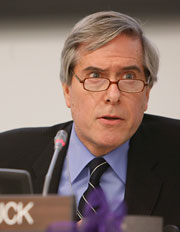
Approximately twenty years ago, on April 6, 1994, a plane carrying the presidents of Rwanda and Burundi was shot down over Kigali, Rwanda, thereby setting in motion a three-month episode in which Rwandan Tutsis were explicitly targeted for extermination, and in which as many as a million Rwandans were killed. A recent MacMillan Center symposium addressing the anniversary of that event led participants to ask “Could it happen again?”
The genocide in Rwanda itself left several legacies that would seem to impede a recurrence. At the international level, Edward Luck (the former [and first] Special Advisor to the UN Secretary General for the Responsibility to Protect) noted that Kofi Annan himself – after having been in charge of the UN’s peacekeeping operations in 1994 – took the personal initiative to commission an independent inquiry into the failings of the UN in Rwanda. That inquiry concluded that the UN “had not been asking the right questions” at the time of the genocide and led to subsequent institutional developments like the creation of the Office of the Special Advisor for the Prevention of Genocide, as well as doctrinal innovations like the “responsibility to protect” and the notion of “(human) rights up front.” New offices and new approaches applied to situations like Kenya’s and Cote d’Ivoire’s respective post-election crises, as well as present-day Central African Republic, produce responses that, if imperfect, are much more robust than what took place in Rwanda. On another track, Zachary Kaufman noted, the international tribunal created in the wake of the genocide blazed new trails in the realm of international criminal justice, curtailing the expectation of impunity that mass atrocity perpetrators had hitherto presumed.
Developments within Rwanda are also encouraging. Kaufman, as well as genocide survivor Consoleé Nishimwe, described how the excise in local-level transitional justice, known as gacaca,combined elements of accountability and social reintegration to keep Rwanda from being pulled back into its past. Yvette Rugasaguhunga, Second Counselor at the Rwandan Embassy to the United States, proposed that achievements like universal primary education and health insurance contribute to the same by elevating dignity and inspiring hope in all Rwandans.
And yet, no one agrees that it is time to declare victory and go home. For example, the international response to mass atrocities amid the Syrian civil war has been lacking. Per writer James Traub, the Syrian case illustrates that for all the innovations in global politics, the will to protect civilians from harm still depends not only on an elusive consensus among the permanent members of the security council, but, perhaps even more important, upon domestic political calculations and a strong tendency toward risk aversion.
Even within Rwanda, genocide’s legacies can be ambiguous. Taylor Krauss (the founder of the organization Voices of Rwanda, which collects video testimony from genocide survivors) reminded the audience that at an individual level, there still exists a range of responses to the trauma of the genocide, and that forgiveness should neither be mandated nor assumed. Nishimwe, a survivor of the genocide in Rwanda who lost five of the seven members of her immediate family in 1994, reminded the symposium that remembering the genocide is a time of sadness as much as (if not more than) it is one of reconciliation and renewal. For all the positive developments that followed the genocide, both within Rwanda and outside it, the pain of the genocide is a legacy unto itself. It is not one readily dismissed by social achievements and institutional innovations.
The symposium was sponsored by the Genocide Studies Program, Council on African Studies, Schell Center for International Human Rights, and received support from the Bill and Dorothy Kempf Fund.
